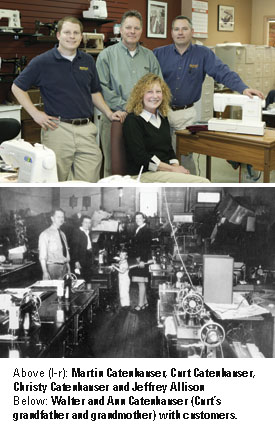Respect, Communication and a Willingness to Accept Criticism
Missouri Sewing Machine Company president Curt Catenhauser considers two qualities essential to adhere to: respect and communication. He feels that respect must also reflect back to those family members who were there before. “The important thing that pertains to any family business,” he says, “is that it has to start with the person who started the business. How they embrace their work ethic, people skills—their philosophy and principles extend to how the business is run today.”
Curt’s grandfather and grandmother, Walter and Ann Catenhauser, opened the Missouri Sewing Machine Company in 1932, servicing machines for the Kansas City Garment District during the Depression. Their son Bob started working with the company after World War II, and son Curt and daughter Vesta came onboard in the 1970s. Today, Curt, his wife Christy, son Martin and nephew Jeff Allison make up the third and fourth generations of the company, which today has expanded to four locations and 20 employees.
“We’re very similar to Budweiser and Anheuser-Busch,” cracks Curt, with a laugh. “Just a little smaller.”
As trends changed, so has the company, which sells and services everything from antique machines to computerized versions. “Now, people who sew like to work with software,” he says. “Sewing, quilting and embroidery have enjoyed a renaissance in the past few years.”
Catenhauser jokes that he only sews “manly things like tarps and grill covers.” But he gets serious when discussing the effect of many generations. “Things like patience or customer service don’t really change,” he says. “But having the younger generation here has introduced our company to new ways of doing things.”

His wife, Christy, who oversees bookkeeping and accounting for the company, says, “We respect how the experienced generation has shown how hard work, positive attitude, good work ethics and responsibility can set the stage for others to carry on the business. After all, isn’t it always the wish to turn over the business to the next generation in better condition than it was when you started?”
According to Curt, it’s important to be able to step back and not overreact when the occasional conflicts do arise. One difference between working with an unrelated employee and a member of the family, he says, is that, with family members, “You have people with devoted work ethics who are willing to work long hours with-out pay—but they also won’t hold back and will say what’s on their mind.”